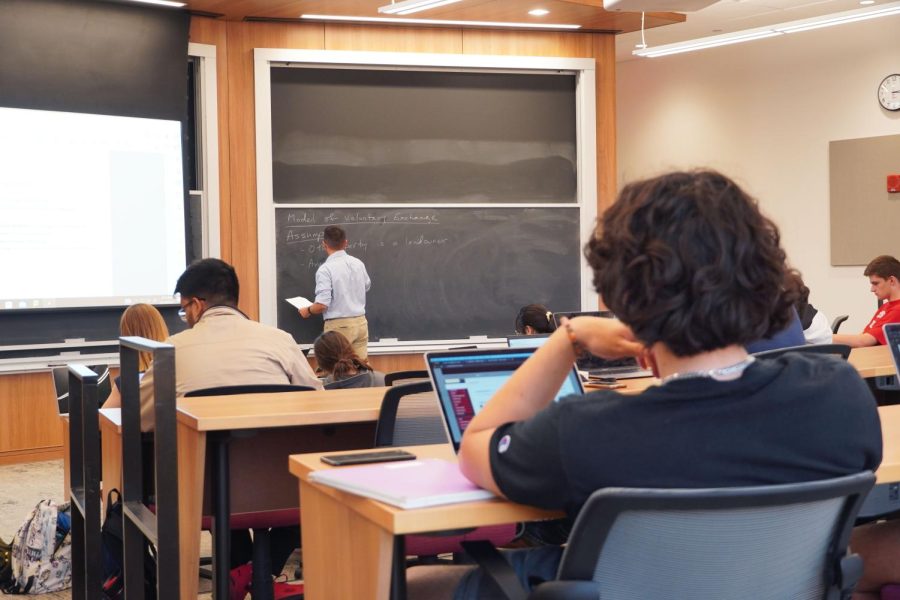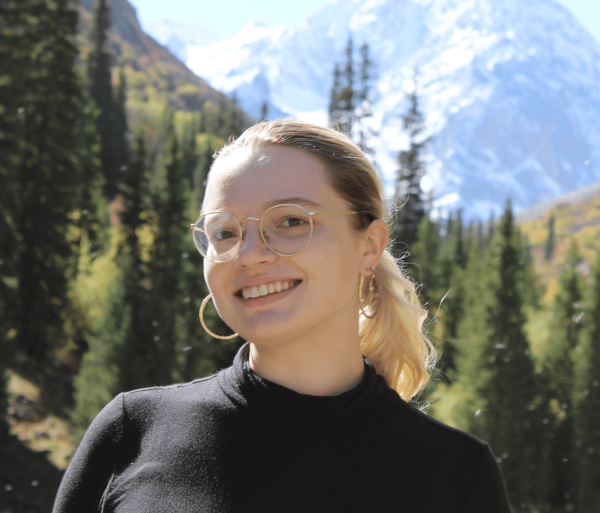Academic freedom concerns arise over proposed Learning Spaces Policy
The proposed Learning Spaces Policy would allow individuals to report incidents they perceive to be harmful to the learning environment.
September 19, 2022
Grinnell College faculty will discuss the proposed Learning Spaces Policy (LSP) at an all-faculty meeting today, Sept. 19.
According to a May 2, 2022 memorandum, the LSP, first introduced by faculty in February 2020, would allow students, faculty and staff to file an “incident report,” and seek an investigation overseen by the Dean’s Office, if a situation occurs in an academic space which results in a perceived “harmful or inhibiting learning environment.”
Clark Lindgren, professor of neuroscience and 2022-23 chair of the faculty, said the LSP is fundamentally an effort to create an avenue for redress when students, particularly BIPOC or LGBTQIA+ students, perceive their identity to be threatened by academic practice.
According to Lindgren and the Feb. 21, 2022 all-faculty meeting minutes, some faculty perceive the current draft of the LSP as not just an avenue for redress, but also as a threat to the academic freedom to exchange ideas and express diverse, sometimes conflicting, viewpoints.
“One of the concerns is that the policy could challenge the effectiveness of teaching if you’re teaching a discipline which is inherently controversial,” Lindgren said. For example, he said that in classroom discussions about race or violence, the possibility of creating an uncomfortable situation for a student is present.
As a result, Lindgren said there is a concern among some faculty that the LSP will cause professors to avoid discussions of controversial topics, to avoid the possibility of a student filing an incident report.
Lindgren also said that another prominent concern among faculty was that incident reports would damage the reputation of accused faculty members, even if the faculty member was cleared under an investigation. Junior faculty, who are not protected by tenure, have voiced this concern the most, Lindgren said. These concerns are also reflected in the April 4, 2022 faculty meeting minutes.
The text of the policy is not finished and continues to be modified to reflect the suggestions of students, faculty and staff involved in the process, according to Lindgren.
The May 2 memorandum, which includes the most recent outline of the LSP, does not provide examples of what would and would not constitute an incident leading to a report. The memorandum also does not detail what types of incidents may result in a penalty, versus what incidents might be deemed as having “no merit” during the formal investigation.
If an incident is determined to have merit, possible redress options include restorative practice interventions and sessions with the chief diversity officer or other professional mediators, according to the May 2 memorandum.
Upon filing an incident report, the May 2 memorandum states that the incident report shall be shared with the dean of the College, the chief diversity officer or their designees. These reports will be confidentially stored in the Dean’s Office but will be collected by the chief diversity officer to be summarized in an annual report to the president and dean of the College. The memorandum did not state if incident reports deemed to have no merit will be included in the annual report or shared with the president.
In February 2020, senior faculty member John Whittaker, anthropology, stated the n-word as an example of a modern “taboo word” during his introductory anthropology course. Whittaker, who is white, later wrote a public letter defending his use of the term as appropriate in an academic context and wrote that he “will not apologize for using an offensive word in a classroom context. Some people feel that speaking a word gives it power. I feel that speaking it without fear and confronting it is a better way of robbing it of its force.” A copy of the open letter, along with a response by Errol Blackstone `20, was published in the S&B in Sept. 2020.
Blackstone and Raven McClendon `22 wrote an op-ed in the S&B that August criticizing Whittaker’s use of the word. Later, in September, students filed a petition in the Grinnell College Disorientation Guide demanding Whittaker resign from his tenured position at the College.
In October 2020, reportedly in response to the same incident, the 2020-21 Executive Council of the College, which includes the president, dean of the College, chair of the faculty and all three division chairs, banned the spoken use of the n-word by faculty, students, staff and visitors in class. The moratorium is still in effect today.
Lindgren said the proposed creation of the LSP, which was first introduced to faculty in February 2020, was not necessarily a direct result from the Whittaker incident. The driving factors for the LSP included the Whittaker incident, Lindgren said, but also discourse surrounding the 2020 George Floyd protests and the increasing emphasis on Diversity, Equity and Inclusion (DEI) initiatives from the College.
Referring to the incident involving Whittaker, Lindgren said, “that was one of the things that raised awareness on the part of faculty that there are issues that probably should be dealt with in a more clear way.”
The intention of the LSP is to address inequities in the classroom and to assist students who perceive their identity to be threatened by discourse, said Lindgren.
“The idea is not just to record it, but to do something about it,” Lindgren said. “The idea would be to create a process whereby some kind of resolution can take place.”
Multiple faculty members, including Dean of the College and Vice President of Academic Affairs Beronda Montgomery, declined request for comment about the LSP due to the ongoing nature of the policy creation process.
Student Government Association (SGA) Vice President for Academic Affairs Jivyaa Vaidya declined request to comment on the extent of student involvement in the LSP this year, also citing the ongoing revisions to the policy.
While the controversial policy may finally come to a head this afternoon with a vote amongst the faculty, the LSP may also once again be postponed or withdrawn, allowing for more revisions to the text of the policy.
The May 2 memorandum and all faculty meeting minutes can be found on the GC Sharepoint website under “Faculty Meeting Information”.


















































